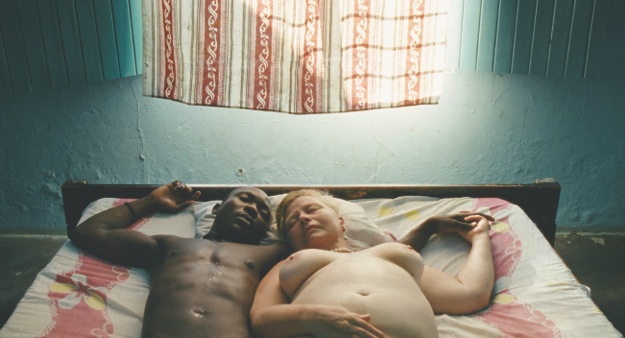AUSTRIAN FILMMAKER ULRICH SEIDL’S PARADISE trilogy takes an unflinching look at society, portraying the lives of three women: an elderly woman and sex tourist (PARADISE: Love), a devout Catholic (PARADISE: Faith), and a teenager who stays at a weight loss camp in the Austrian Alps (PARADISE: Hope). At festivals in Cannes, Venice and Berlin the films earned praise and prizes but also drew sharp criticism. In 2013 all three films will be released in the USA.
Seidl’s protagonists are socially withdrawn, isolated and lonely. They are frequently abusive and find pleasure in physically and mentally torturing themselves or each other.
Anna Maria’s idea of paradise is closely associated with Jesus Christ. In PARADISE: Faith we see her praying while walking on her knees. She spreads the word of God by walking from door to door with a statue of the Virgin Mary. Anna Maria’s relationship with Jesus Christ becomes more and more physical: she masturbates with a crucifix and flagellates herself. PARADISE: Hope depicts Melanie, who hopes to be slim and happy one day. At a weight loss camp Melanie is trained in fitness, nutrition and behavior change. The girl smokes her first cigarette and falls in love with an older man, the manager and doctor of the camp, who struggles with the girl’s innocent attempts at seduction. Teresa, from PARADISE: Love, is a plump blonde in her 50s who no longer meets the Western world’s standards of beauty. She travels to Kenya in search of love but finds herself turning from one beach boy to another. In a hotel room Teresa and two other women verbally humiliate a young stripper who cannot get a full erection.
Seidl’s films are not for the faint-hearted. By deploying social taboos, the films challenge the standards and norms of Western society. Outspoken dialogue such as the one between Teresa and her friend reveal social dynamics, power relations and hierarchy.
Teresa: Do you think I should shave down below?
Teresa’s friend: No. [The men here in Kenya] like that we look different from [their] women. They have tiny curls. It’s all frizzy, while we [whites] have a bush.
Teresa: My last boyfriend wanted me to shave.
Teresa’s friend: Don’t do it. You look like a naked baby. […] It’s natural and they like that here. They like everything that’s wild.
Seidl lives and works in Vienna, where he runs his own production company. He was born in 1952 and spent his childhood in Horn, a small town in Lower Austria. His upbringing was characterized by bourgeois morals and the dogma of the Catholic Church. Seidl describes his father, a doctor, as pious and strict, and his mother as a devoted wife who raised five children. Seidl attended various Catholic schools and served as an altar boy in his parish. He suffered under these rigid structures but he was also fascinated by Baroque churches with their elaborate altars and dramatic intensity.
His first films were made while he was still a student at the Vienna Film Academy. The short One-Forty (Einsvierzig) (1980) portrays a man of short stature, while The Prom (Der Ball) (1982) depicts a graduation dance in Seidl’s hometown. The filmmaker never spares the protagonists in these films. He shows no insincere sympathy, neither for a physically challenged person nor for the hypocrisy of an inhibited, ritualistic society. This has led to harsh criticism in Austria and established Seidl’s reputation as a cynical and exploitative social-pornographer.
When shooting a film, the director does not use a detailed screenplay. Instead, he creates various dramatic settings in which the actors are free to improvise in ways that often alter the director’s initial ideas. He films almost exclusively on location and frequently uses nonprofessional actors whose manner of speaking is an integral aspect of his work. All of Seidl’s characters speak Viennese, or the dialects of Eastern Austria. The sound of these dialects is rather soft, which stands in stark contrast to the aggressive body language and cruel nature of many of the characters.
Seidl never judges but rather observes and depicts his protagonists’ pursuit of happiness. Critics and audience seem split between vehement disgust and fervent praise. Repetitive scenes of humiliation and intimacy can turn the viewer into an unwilling accomplice. This makes the films fascinating and shocking at the same time.


